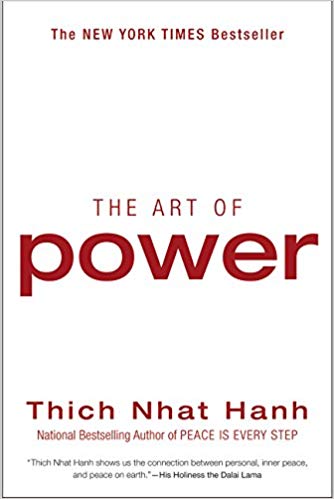
I note three things distinctive about the writing style of Thich Nhat Hanh (Vietnamese Buddhist monk and founder of the Order of Interbeing):
The first is its simplicity. He writes in unadorned subject-verb-object prose that has an almost childlike quality. At first, it gives an impression of naïveté, but that impression shifts to a sense of stillness in the voice. There is a clarity at the heart of his writing.
The second is its recursive nature. It isn’t that he repeats himself, more that he spirals upwards, returning to old themes but lending them a fresh observation or illustrative story. It’s fitting that he should write this way, since reading can be as non-linear as meditation if we are open to treating it that way. The words can be the object of focused concentration. If we read simply to finish the book so that we can say we have read the book, then we’re like the person who prefers to fly everywhere so he can get there in a hurry. By hurrying, he misses the delight of the journey. As with the simplicity of each sentence, there’s a stillness that fills the whole book and invites us to sit with it rather than hurry through it.
The third distinctive thing is the absence of the word “should.” It is rare to read a book about living well that doesn’t use the word should. This book follows a non-judgmental approach. Choices are presented in a purely descriptive manner: If choice A, then B is the likely consequence; but if choice C, then D is the likely consequence. The reader sits between choice A and choice C without a “should” to direct the choice. The power to choose abides with the reader. In a nutshell, that is what The Art of Power is about. Power is is not something outside ourselves which we harness and then impose on others (as an author might upon his readers), but is something we discern within ourselves and practice in ways which radiate outwards. Thich Nhat Hanh doesn’t tell his readers that they should do one thing or another. Instead, he invites his readers to mindful living. It is from within the practice of mindfulness that right choices arise.
Much of the book is devoted to mindful practice, setting out the five mindfulness trainings, exploring mindfulness in practical contexts, and concluding with an appendix of “Meditations to Cultivate Power.” It addresses the small. For example, it talks about mindful walking. Thich Nhat Hanh writes: “I touch the ground as if I am kissing the earth with my feet, with a lot of love.” What begins small — a single step upon the earth — becomes expansive. Everything is connected to everything else — everything inter-is. At the same time, it addresses large issues. For example, it speaks to the war on terror, observing that “deep listening is more powerful than bombs.” “The path is the path of peace. … there is no way to peace — peace is the way.” But our approach to global issues takes us inevitably inside our own hearts. Mindful speech. Mindful action.
This inward movement that seeks to address the global suffering of power misunderstood causes me to re-evaluate a claim regarding Buddhist philosophy. In an previous post titled Beyond The Golden Rule, I had mentioned the oft-cited claim that the “Golden Rule” or ethic of reciprocity (“Do unto others as you would have them do unto you”) is present in all spiritual traditions. In fact, that isn’t true of Buddhist philosophy. An ethic of Buddhism might be: “Do unto yourself that you might benefit the whole world.” In other words, look into your self mindfully, and the happiness you find there will prove to be a gift, not simply to yourself, but to the world. It’s transformative power is true power.
“When you take one mindful step, it might seem that you are taking a step for yourself alone. You are trying to find some peace, some stability, some happiness. But with insight, you see that everything good that you do for yourself, you are doing for all of us. If just one person in a family or a community practices, that practice will benefit everyone, not only the practitioner.”
